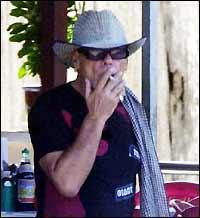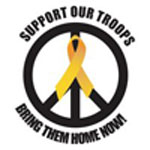Sorry I didn't pick this up earlier. Via
Truthout:
San Francisco - Forty-eight lawsuits against the nation's largest telecommunications companies for alleged participation in a warrantless government surveillance program had their first day all together in court Friday, in a courtroom packed with more than two dozen lawyers for the government, the companies and civil liberties groups.
The class-action lawsuits accuse BellSouth, Cingular Wireless, Sprint, MCI, Verizon, AT&T and even cable provider Comcast of violating various privacy and fair business laws for allegedly collaborating with the government's warrantless eavesdropping on Americans' overseas phone calls, domestic phone logs and internet usage. Together, the suits seek millions in damages.
A group of judges known as the Multidistrict Litigation Panel ordered all the lawsuits sent here in August to be heard by Chief Judge Vaughn Walker, who'd been hearing an early lawsuit over the surveillance filed by the Electronic Frontier Foundation.
The so-called Terrorist Surveillance Program, revealed in December 2005 by The New York Times, has been acknowledged by the Bush administration, which says it targets calls to and from the United States from overseas when one party has a suspected relationship to a terrorist group. The administration says the president's wartime powers allow the program to operate outside the nation's surveillance laws, which require that wiretaps, even of suspected terrorists, be explicitly authorized by a judge.
Government lawyers have attempted with some success to have legal challenges to the surveillance thrown out on the grounds that they could reveal state secrets, but in San Francisco, Walker danced around that assertion in EFF's case against AT&T.
The libertarian-leaning, Republican-appointed Walker refused to dismiss that case in a landmark ruling in July, saying that the program was no longer secret since the government had admitted it existed and "public disclosures by the government and AT&T indicate that AT&T is assisting the government to implement some kind of surveillance program."
In Friday's hearing, the government asked the court to freeze all work on the 48 cases until an appeals court can review Walker's ruling. Instead, Walker scheduled further hearings in December and February. The 9th US Circuit Court of Appeals has not yet scheduled a hearing on the appeal, though all briefs are due by early April.
Among the issues in Friday's hearing was a government bid to combine all 48 complaints into one massive lawsuit.
Deputy Assistant Attorney General Carl Nichols argued that all the cases should be merged so the government can more easily have them all dismissed by invoking the state secrets privilege, which he said Walker needed to give deference to.
EFF legal director Cindy Cohn argued that each company deserved its own complaint, saying each acted on its own.
"This isn't a big conspiracy by telecoms, where this is part of a joint plan," Cohn said.
Walker sided with Cohn, ruling that each telecommunications company would get its own comprehensive complaint. As a result, the 48 lawsuits around the country will be merged into just five, all in San Francisco.
The court also decided to take up a long-pending motion by media interveners, including Wired News and the Associated Press, to have sealed documents at the heart of the EFF's case opened to the public.














0 Comments:
Post a Comment
<< Home